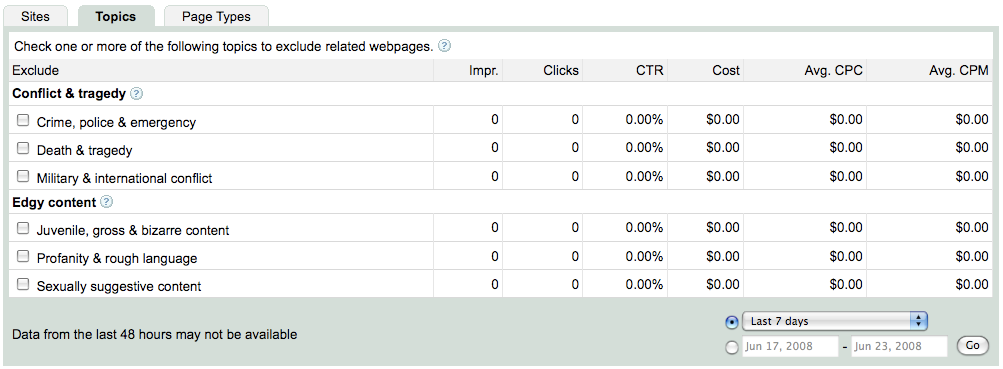Google recently added category exclusion to its adwords system, allowing advertisers to choose not to support content that deals with topics such as “death & tragedy” and “military & international conflict”. The new category exclusion feature allows an advertiser exclude from its content network any pages that belong to a specified set of topics or page types.

Here are description of the exclusion topics:
Conflict & tragedy:
Crime, police & emergency: Police blotters, news stories on fires, and emergency services resources
Death & tragedy: Obituaries, bereavement services, accounts of natural disasters, and accidents
Military & international Conflict: News about war, terrorism, and sensitive international relations
Edgy content:
Juvenile, gross & bizarre Content: Jokes, weird pictures, and videos of stunts
Profanity & rough language: Moderate use of profane language
Sexually suggestive content: Provocative pictures and text
The topic exclusion is the most interesting, because it directly supports an argument I’m making (in a paper I’m writing now on surveillance, google, and botnets) that google’s adwords system is a primary driver of a move away from stories about “death & tragedy” in far away places and toward stories about digital cameras. Notice that “consumer electronics” is not one of the exclusion topics.
Here are the page types:
Network types:
Parked domains are sites in Google’s AdSense for domains network. Users are brought to parked domain sites when they enter the URL of an undeveloped webpage into a browser’s address bar. There, they’ll see ads relevant to the terminology in the URL they entered. The AdSense for domains network is encompassed by both the content network and the search network. If you exclude this page type, you’ll exclude all parked domain sites, including the ones on the search network. Learn more.
Error pages are part of Google’s AdSense for errors network. Certain users are brought to error pages when they enter a search query or unregistered URL in a browser’s address bar. There, they’ll see ads relevant to the search query or URL they entered. Learn more.
User-generated content:
Forums are websites devoted to open discussion of a topic.
Social networks are websites offering an interactive network of friends with personal profiles.
Image-sharing pages allow users to upload and view images.
Video-sharing pages allow users to view uploaded videos.
These page types are interesting as well because they exert control over the presentation as well the substance of a given topic. If the commercial interests don’t like video sharing then by gosh there will be less video sharing.
For both the page types and the topics it would be helpful for Google to provide information about how specific pages are classified. Such knowledge could discourage content owners from publishing content that they know will trigger the “death & tragedy” topic, but the lack of knowledge about how the classification works could have the even worse effect of content producers being doubly careful not to produce any content that might be classified as an excluded topic. In either case, the topics are likely to have a strong effect on the kinds of content that gets published.
One Comment
I don’t fully agree that “triggering” content will become less commonplace – there’s far too much of a market for juveunile, sexually explicit, profane and violence-based content and there are entire industries with thriving affiliate strategies constantly fueling these sites.
However it would be useful, as you say, for Google to release more information about classification. Although with Google’s track records, there’s little hope they will be this open.